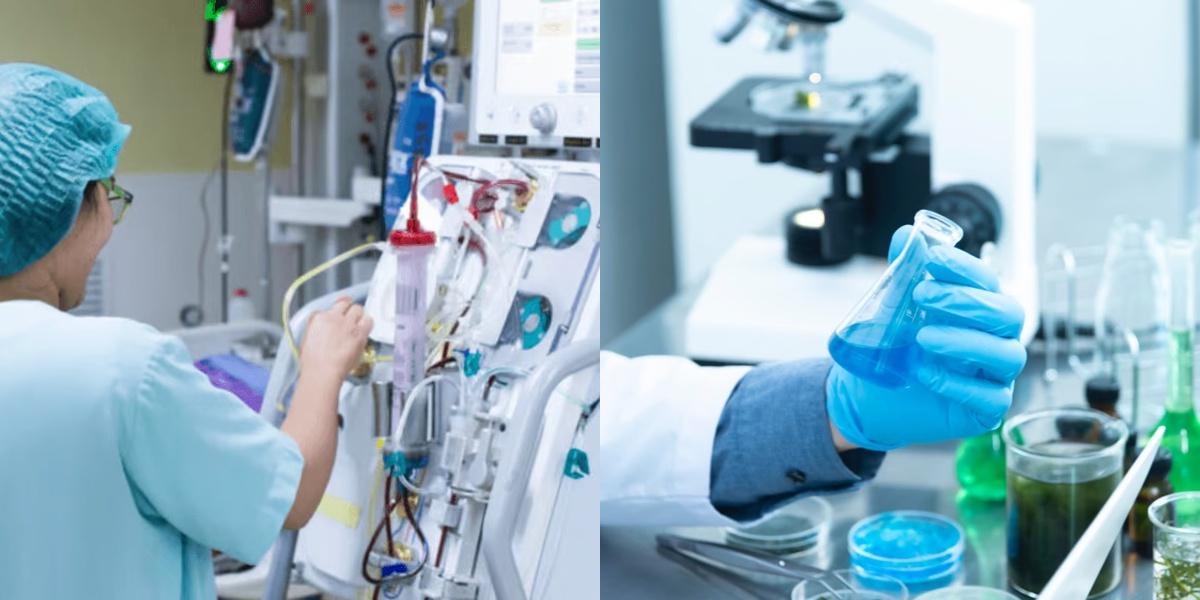Hemodialysis Technician vs Sterile Processing Technician

Want personalized recommendations?
Let's match you to the right program

Are you considering a career in the medical field but unsure which path to take? Two options worth exploring are becoming a Hemodialysis Technician or a Sterile Processing Technician. While both roles play crucial roles in patient care, they have distinct differences in terms of job responsibilities, education, and career outlook. In this blog post, we will compare the two professions to help you make an informed decision about which path is right for you.
Article continues after recommendations
Recommended for you
What is a Hemodialysis Technician and Sterile Processing Technician?
Before we delve into the differences between the two professions, let's first understand what a Hemodialysis Technician and a Sterile Processing Technician do.
A Hemodialysis Technician is a healthcare professional responsible for operating and maintaining dialysis machines used to treat patients with kidney disease or kidney failure. They work closely with patients, monitoring their vital signs and ensuring the safe and efficient removal of waste and excess fluid from their blood.
On the other hand, a Sterile Processing Technician is responsible for ensuring that all medical instruments and equipment used in surgical procedures are properly cleaned, sterilized, and maintained. They play a critical role in preventing infections and ensuring the safety of patients and healthcare providers.
Difference between a Hemodialysis Technician and Sterile Processing Technician
While both professions are essential for providing quality patient care, there are several key differences between a Hemodialysis Technician and a Sterile Processing Technician:
1. Job Responsibilities:
- Hemodialysis Technicians primarily work with patients undergoing dialysis treatments. They are responsible for setting up and operating dialysis machines, monitoring patients' vital signs, and ensuring the safety and comfort of patients during the procedure.
- Sterile Processing Technicians, on the other hand, work behind the scenes. They are responsible for cleaning, sterilizing, and assembling surgical instruments and equipment. They also manage inventory and ensure that all instruments are in proper working order.
2. Work Environment:
- Hemodialysis Technicians typically work in dialysis centers or hospitals where dialysis treatments are performed. They may also provide in-home dialysis services.
- Sterile Processing Technicians work in sterile processing departments within hospitals, surgical centers, or other healthcare facilities. They may also work in central supply departments or sterile processing companies.
3. Interactions with Patients:
- Hemodialysis Technicians have direct interactions with patients as they provide care during dialysis treatments. They build relationships with patients and offer emotional support during their treatment sessions.
- Sterile Processing Technicians have limited interactions with patients as their work focuses on preparing and maintaining sterile instruments and equipment. However, their meticulous attention to detail indirectly contributes to patient safety.
4. Skill Requirements:
- Hemodialysis Technicians need to have strong communication skills to interact effectively with patients and other healthcare professionals. They must also have a good understanding of dialysis procedures and be able to respond quickly in emergency situations.
- Sterile Processing Technicians require excellent attention to detail and organizational skills. They must follow strict protocols to ensure that all instruments are properly cleaned and sterilized. They also need to have knowledge of different sterilization techniques and equipment.
Hemodialysis Technician vs Sterile Processing Technician: Job Description
Now that we have covered the differences between the two professions, let's take a closer look at the specific job descriptions of a Hemodialysis Technician and a Sterile Processing Technician:
Hemodialysis Technician Job Description:
- Set up and operate dialysis machines, including monitoring patients' vital signs and adjusting machine settings as needed.
- Prepare patients for dialysis treatments by sterilizing access points and connecting them to the dialysis machine.
- Monitor patients during dialysis treatments, ensuring their comfort and safety.
- Document and report any changes in patients' conditions or adverse reactions to treatment.
- Maintain and clean dialysis equipment according to established protocols.
Sterile Processing Technician Job Description:
- Receive, sort, and disassemble contaminated surgical instruments and equipment.
- Clean, decontaminate, and sterilize surgical instruments using appropriate techniques and equipment.
- Assemble and package sterilized instruments and equipment for surgical procedures.
- Maintain inventory and order supplies as needed.
- Inspect instruments for damage or wear and arrange for repair or replacement when necessary.
Hemodialysis Technician vs Sterile Processing Technician: Education and Training
The educational requirements and training for Hemodialysis Technicians and Sterile Processing Technicians differ. Here's what you need to know:
Hemodialysis Technician Education and Training:
- Most Hemodialysis Technician programs require a high school diploma or GED.
- Some states may require certification or licensure, which can be obtained through accredited training programs.
- Training programs for Hemodialysis Technicians typically last 6-12 months and include both classroom instruction and hands-on clinical experience.
Sterile Processing Technician Education and Training:
- A high school diploma or GED is typically required to become a Sterile Processing Technician.
- Some employers may prefer candidates with certification, such as the Certified Registered Central Service Technician (CRCST) credential, which can be obtained through accredited training programs.
- Training programs for Sterile Processing Technicians vary in length but usually range from a few weeks to several months. They include both classroom instruction and hands-on practice.
Get courses selected just for you
Try our powerful search engine
Article continues after recommendations
More recommendations for you
Hemodialysis Technician vs Sterile Processing Technician: Career Outlook and Salary
Both Hemodialysis Technicians and Sterile Processing Technicians have promising career outlooks and competitive salaries. Here's what you can expect:
Hemodialysis Technician Career Outlook and Salary:
- The demand for Hemodialysis Technicians is expected to grow due to the aging population and the increasing prevalence of kidney disease.
- According to the Bureau of Labor Statistics, the median annual wage for Hemodialysis Technicians was $40,350 as of May 2020.
Sterile Processing Technician Career Outlook and Salary:
- The demand for Sterile Processing Technicians is also expected to grow as healthcare facilities continue to prioritize infection prevention.
- According to the Bureau of Labor Statistics, the median annual wage for Sterile Processing Technicians was $35,720 as of May 2020.
Final Thoughts
Choosing a career in the medical field is a noble and rewarding decision. Both Hemodialysis Technicians and Sterile Processing Technicians play vital roles in patient care, although their job responsibilities and training requirements differ.
If you enjoy direct patient care and want to make a difference in the lives of individuals with kidney disease, becoming a Hemodialysis Technician may be the right path for you. On the other hand, if you have excellent attention to detail and a passion for maintaining a sterile environment, a career as a Sterile Processing Technician may be a better fit.
Consider your interests, strengths, and long-term career goals when making your decision. Whichever path you choose, both professions offer stable job prospects and opportunities for growth within the healthcare industry.
Dreambound's educational programs are conveniently available in diverse locations, ensuring accessibility for aspiring individuals. For a more comprehensive understanding of the exciting opportunities within the realms of these two vocations, we invite you to explore further details by visiting:

Stephanie Dayak is the go-to person for everything related to automation and integrations at Dreambound. As a Certified Tax Technician turned tech whiz, her sharp eye for detail and passion for efficiency become evident in every project she undertakes. When not solving tech puzzles, she's out exploring the local food scene, cozying up with her dogs, or plugged into a thought-provoking podcast. She's an ardent believer in mixing fun with functionality!




